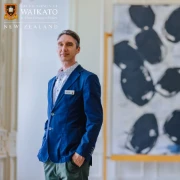Is it possible to predict lethal and non-lethal family violence? Te Puna Haumaru Seminar Series
Kirikiriroa Conversations: The Talking Dead – How AI powered thana-tech will prevent social death
- Thursday 25 Jul 2024
- 3.30pm - 4.00pm
- K.G.01
- Dr Kyle Barrett
- kyle.barrett@waikato.ac.nz
Media and Creative Technologies are proud to present another series of Kirikiriroa Conversations. The aim of these public kōrero are to explore topics of interest from academic staff and graduate students across the University that may be works-in-progress, recently published papers, or general areas of interest.
It is an opportunity to explore avenues of research or practice that may not have found a place in a lecture or publication. Why not discuss it in a friendly, open, informal environment? The format for presenting is that each conversation will be 15 mins long with 5 mins of questions. These start at 3:30PM in K.G.01. Afterward, come along to MCT's legendary Thirsty Thursdays (BYO) in our foyer (I.4.20) to continue the kōrerō.
Second Conversation: "The Talking Dead: How AI powered thanatech will prevent social death".
Presenter: Prof. Gareth Schott.
Abstract: In the face of incontrovertible evidence of the universality of physical death, artificial intelligence (AI) is now being applied in fulfilment of a longstanding human pursuit for symbolic immortality. With the emergence and growth of a death-tech industry (Bassett 2018) communication with the dead has moved beyond esoteric supernatural practices of Ouija boards, séances or the services of a medium. Within thana-technology, AI is applied to generate and conduct posthumous interactions with defunct users as if they were still responsive, perceptive and keying responses. Such digital adjuncts to life, draw on the para-social networked nature of contemporary living, fulfilling the needs of those who “desire to stay continually connected” (Przybylski et al. 2013) in life, to endure beyond death. The digital endurance of personhood via thana-bots is a complex matter requiring AI to execute the proxy-agency given to it to communicate, respond and recall memories in a manner that creates a thana-social model of relationships resembling something of what people once shared in life. Here, it is argued that the nature of AI digital afterlives should be given closer attention for the ways in which we allow the dead to communicate when repositioned back “within the flow of everyday life” (Gibbs et al. 2015, 257) as social actors.
Dr Kyle Barrett & Professor Gareth Schott

Professor